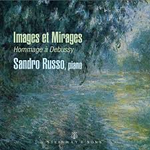|
Back
09/30/2018
“Images et Mirages”
Claude Debussy: Images, L 110 [Set I] – Images, L 111 [Set II] – Prélude à l’après-midi d’un faune, L 86 (arr. L. Borwick) – Nocturnes, L 91: “Fêtes” (arr. V. Leyetchkiss) – Lindaraja, L 97 (arr. J. Roger-Ducasse) – Nuit d’étoiles, L 4 and Beau soir, L 6 (arr. K. Attwood) – “Il pleure dans mon cœur”, from Ariettes oubliées, L 60 (arr. D. Ericourt)
Florent Schmitt: “A la mémoire de Claude Debussy” from Mirages, opus 70
Paul Dukas: “La Plainte, au loin, du faune” from Le Tombeau de Claude Debussy
Manuel de Falla: “Hommage à Debussy” from Le Tombeau de Claude Debussy
Sandro Russo (piano)
Recording: Patrych Sound Studio, New York City (May 27 and June 12, 2018) – 70’35
Steinway & Sons 30105 – Booklet in English

   
It’s evident Sandro Russo knows his charge when it comes to the color-in-want from Claude Debussy. This exposition of the Italian’s wishes and desires is handled with balance, thoughtfulness and introspection.
Seeing that this impeccable Steinway & Sons recording is subtitled “Hommage à Debussy” engenders a pensive CD outline. The opening piece, “Reflets dans l’eau”, says it all: we’re in a scarf of rumination...both selection and position of assorted compositions are artistically inclined. The format is unveiled: a Debussy piece is performed, followed by a réflexion [from another composer.] The best representation of this dichotomous resolve lands inside Paul Dukas’ “La Plainte, au loin, du faune” and the indirect pings of Prélude à l’après-midi d’un faune.
One of the indelible impressions of M. Russo’s fascinations is how Debussy’s musical warmth is handled with decorum of distance. For example, the Images, Set II elicits persuasive auras without pounding the listener with inveterate literalism...edges are softened without relinquishing Debussian purpose.
If Claude Debussy is wholeheartedly personified as “contemporary”, then one’s mind will be reconditioned through the approaches by Borwick and Leyethchkiss. Sandro Russo climbs another rung by politely notching up his take of elegant sophistication. As the clock moves forward, so goes the theory of maturity. Jean Roger-Ducasse’s transcription of Lindaraja makes for a brocaded, sporty habanera-like rhythm, landing yet another argument in favor of M. Russo’s keen persuasive energies.
We seem to be moved into a greater mode modern when experiencing interpretations by Koji Attwood and Daniel Ericourt. Their collection of Debussy’s “Three Songs” magnifies the tribute. The listener appears to be catapulted into the 21st century, complimented by the finesse of Sandro Russo.
Although Sandro Russo’s overall vibe trends conservatively, pockets of greater determination are ingrained: we turn back to the “Mouvement” from Images. In this case the thematic “rush” is appropriate and predominant. Sandro Russo senses a fast forward thinking approach as he plays the notes, giving Debussy’s movement greater credibility and plausible chemistry.
“Images et Mirages” has an even-handed approach to Claude Debussy. Devoid of overt frills and cataclysmic gyrations makes Sandro Russo persuasive, genuine and grounded in performance. A convincing display.
Sandro Russo Website
Christie Grimstad
|